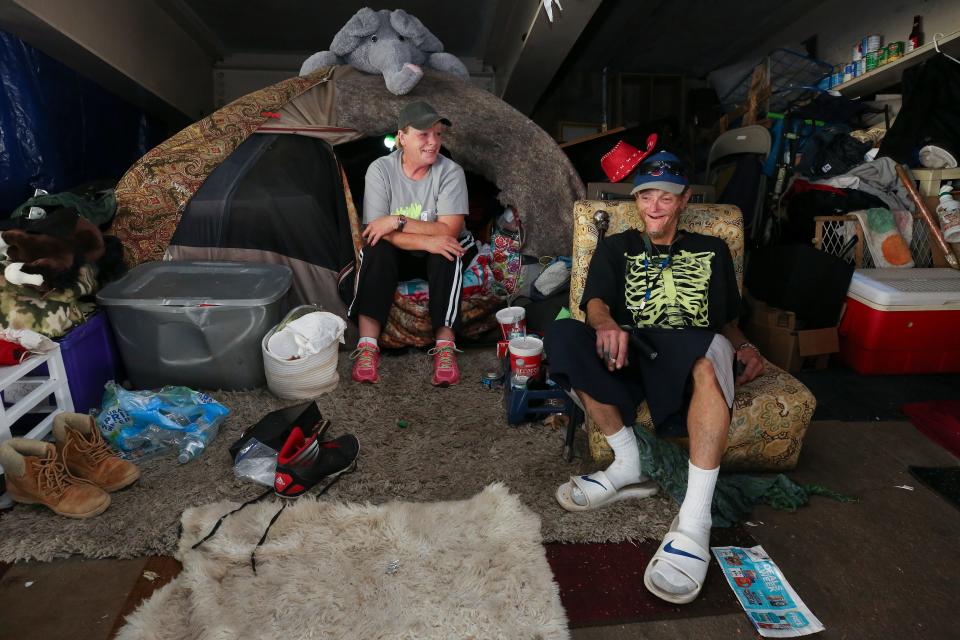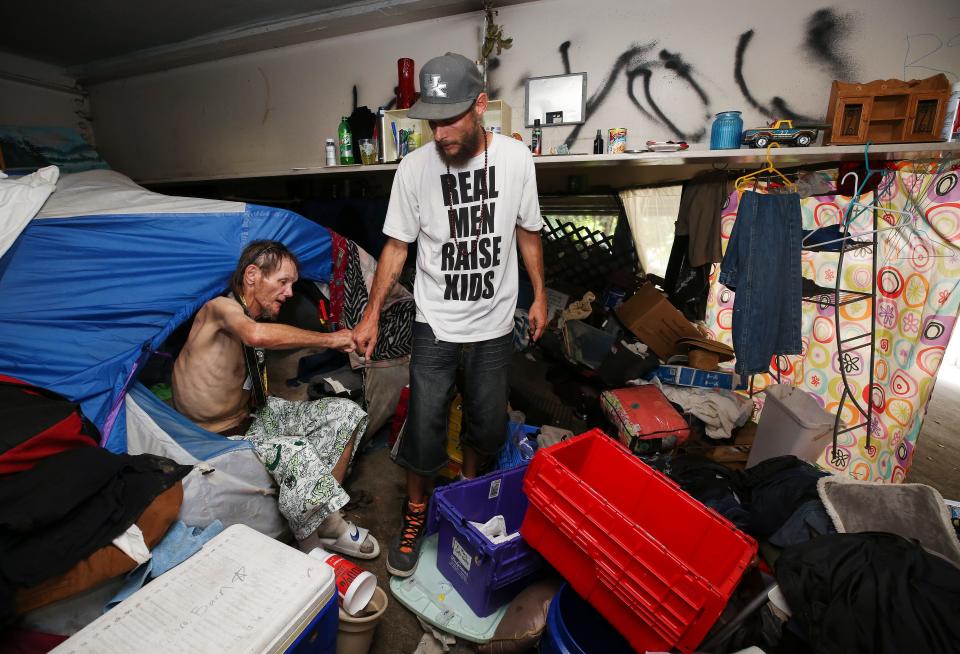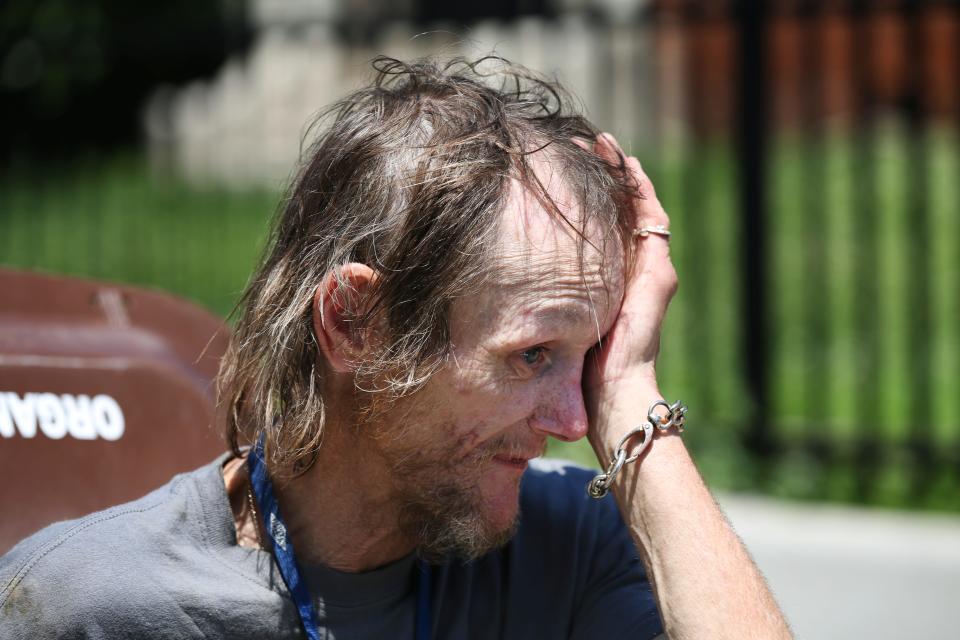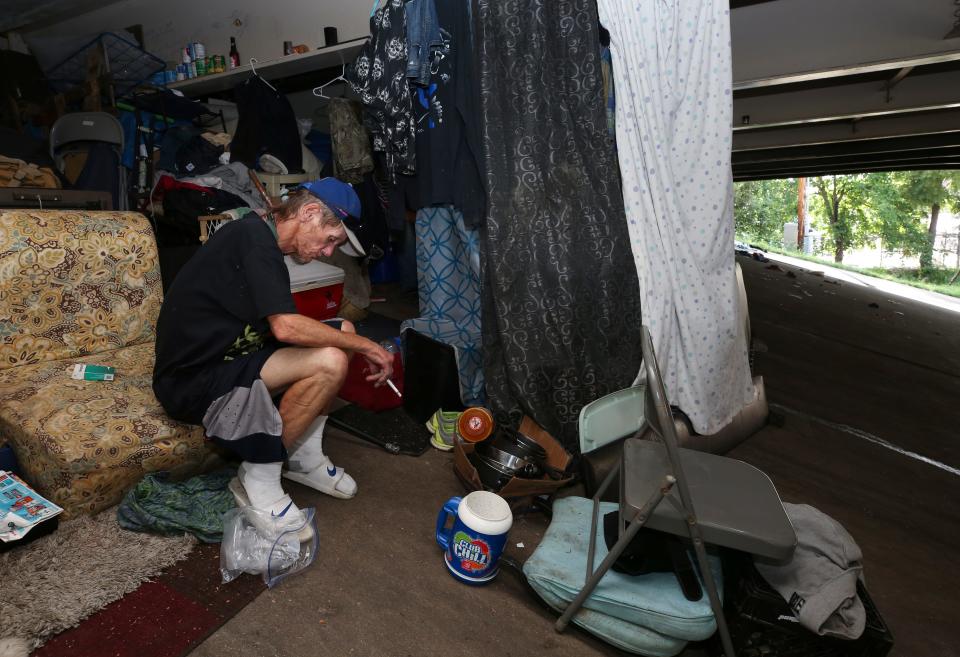'Nowhere to turn': Homeless with cancer, a Louisville man struggles each day to survive
Standing just up the block from the overpass he had called home in Louisville, Kentucky, Brent Spradlin felt drained.
It's the same way he'd felt for months. His sunken, gray eyes welled with tears.
"I feel ashamed that I am living here," Brent said in a soft, raspy voice. "And when I get hungry, I have nothing to eat. I have no money. I have nowhere to turn to. … I just feel like jumpin’ off the bridge half the time. I have to say it. I never thought of suicide 'til now.
"I won’t never do it. But, I’ve sit here and cried for several nights, not knowing what to do."
At 55, Brent is fighting throat cancer, living in a vacant lot and losing hope.

His 5-foot-6 frame is nearly all bones. He weighs maybe 105 pounds.
Each day — until Tuesday, when city crews raked and removed most of his belongings in a sweep — he shuffled to his makeshift home atop the steep incline of the Interstate 65 overpass on Breckinridge Street. Each day, he endures oppressive heat and the relentless swarm of mosquitoes that come with it.
For Brent and other homeless people living with serious, chronic illnesses, there are few places to turn in Louisville as they deal with true matters of life and death.
The city's homeless resources are stretched impossibly thin, and the waiting list for permanent housing seems endless. Shelter beds for those with disabilities and life-threatening conditions are scarce. There are some hospice beds, but only for those who end medical treatment.
"There’s a lot of Brents out here," said Jeff Gill, founder of the street outreach group Hip Hop Cares. "There’s a lot more at stake than just clearing some people out, and Brent is a clear case of that."
'Baby Shark': Florida officials play song on repeat to keep homeless people out of local park
At least seven homeless camps have been cleared in Louisville since March — including Brent's on Tuesday — shuffling displaced people from camp to camp.
But the homeless with serious illnesses are especially hard-hit by these closures.
Brent was scheduled for chemotherapy two days before his camp initially was set to be cleared July 12.
He opted to reschedule his treatment rather than risk being too weak from the chemo to pack and haul his belongings to a new campsite. He wanted a new spot nearby to stay close to Norton's campus for his medical appointments.
His eviction was postponed, but only by four days.
From eviction to a viaduct
The stories of many homeless people in Louisville start much like Brent's.
One problem compounds another, and there's no safety net to catch them before they end up on the street.
Brent hasn't been homeless long. He and his friend, Kim Morrow, split an Old Louisville apartment they rented for $460 a month.
More health issues: As homeless are suffering, risk of hepatitis, typhus and other diseases is growing
Brent has received disability income since 1995 for a back injury he sustained while working for years in construction. Between the roughly $770 a month he receives and Kim's intermittent paychecks, the pair got by.
That changed last fall.
"I had some friends over," Brent said. "My wallet came up missing with the rent money (in it), and it kind of went downhill real fast from there. I ended up being evicted."
Brent's church helped him collect some of the rent money, but it wasn't enough. Evicted in November, Brent turned to the Salvation Army shelter for a bed while Kim went to the viaduct.
But the shelter limits how long people can stay. Once his time was up, Brent joined Kim under the overpass.
"It's worse than jail, I would say," Brent said. "… If it rains, it floods under there. Everything’s pretty much mildewed there from the rain. You have the rats."

And then there is the noise. People "screamin', hootin', hollerin', fightin', arguin'" at all hours of the day and night, and the unceasing clanging, rattling and shaking of the interstate overhead.
"At this point, I have to joke about it because if I don’t, I’m probably going to cry or go nuts," Brent said.
Celebrities helping others: Jaden Smith celebrates his birthday with free vegan food truck for the homeless
After Tuesday's sweep, he set up camp in a nearby vacant lot. The noise of the interstate is gone, but he has a new neighbor and the same old problems. His body, for one.
Over the years, he's had back surgery, a hernia, a stroke, recurring struggles with addiction and now, the throat cancer. All of his teeth have been pulled — which is how he found out about his cancer three years ago.
Brent was getting ready for dentures when his dentist noticed a knot in his throat. Multiple rounds of antibiotics didn't clear it up, so he went to an ear, nose and throat doctor.
That's when Brent, who survived stage-three colon cancer in the early 2000s, found out he had cancer again.
"I’ve done radiation and chemo. I got stronger every day, but that about killed me," he said. "I lost a lot of weight. But, I made it through."
When they had the apartment, Kim was Brent's caretaker. She cooked for him when he could eat and kept his feeding tube clean when he couldn't. There were times she had to help him get out of the bathtub because he was so frail, and she went with him to countless doctor's appointments.
“It has really zapped him," she said.
Brent started to gain some weight and got his feeding tube out, but then he got evicted.
“And then it all went downhill," he said.
Runway at the Salvation Army: Tears and second chances at a homeless shelter's fashion show
'We're fighting a war'

Brent takes multiple prescriptions for nausea and Suboxone for his pain and withdrawals. For other homeless men and women managing chronic and life-threatening conditions, life can be even tougher.
Local advocates say they've seen clients struggling with cancer, chronic obstructive pulmonary disease, ostomy bags and amputations, along with mental illness and addiction.
“We’re fighting a war, and I don’t think most of us know what war we’re fighting," Gill said. "There’s a lot of people out here that really need our help, need our attention and need our focus, and we’re letting them down. I talk to them daily. … I know that when they get put in certain situations it elevates mental illness and addiction and causes overdoses and suicides.
"Right now we’re stuck in a really vicious cycle, and we’ve got nowhere for them to go.”
Across the county, people with disabilities represent about one-quarter of adults experiencing homelessness.
People on the streets have higher rates of illnesses such as diabetes, hypertension and depression, and on average die 12 years sooner than the general population, according to the National Health Care for the Homeless Council.
Even the best medical care is not as effective if a patient is living on the street or in a shelter, a council report said.
A recent study by the University Louisville recommended that doctors and nurses go where homeless men and women live to provide them medical care. The report also recommended increasing the number of beds dedicated to medical respite care at shelters.
Homeless in college: Students sleep in cars, on couches when they have nowhere else to go
Natalie Harris, executive director of the Coalition for the Homeless, said Louisville has some short-term medical beds available, but it has nothing for people living on the streets with serious, long-term health conditions.
The Salvation Army, for example, has six handicap-accessible beds for homeless men at its Brook Street shelter. Unlike the other beds, these are on the ground floor and have an accessible shower and toilet.
However, as a temporary shelter, the Salvation Army limits how long clients can stay to 45 days a year unless they enter a case-management program.
Brent has already maxed out his allotted days at the Salvation Army for the year.
What many of these people need, Gill said, is assisted living. He can think of 10 people who could use that level of support right now.
But, Harris said, people without income have a hard time getting access to nursing homes.
There are also a small number of hospice care beds, she said, but only for those diagnosed as terminal and who have discontinued their treatment.

Trapped in a cycle of homelessness
For Brent, days under the overpass often blurred together.
On Tuesdays, he knew a church group would come with food and water. The other days, he'd amble to the next street up to grab a sack dinner.
In addition to his disability check, Brent used to receive about $50 in food stamps, but he let that benefit lapse.
He wishes he had it now.
He had a Section 8 housing voucher but lost it a decade ago after getting into trouble with the law. He has Medicaid, but it doesn't cover all his health care costs.
Harris said a lot of homeless people qualify for disability income, but it's not a quick or easy process without a permanent address.
They need their medical records, which "is not easy to do if you've been on the street for a long time," Harris said. And many get rejected the first time they apply.

There are grant-funded options for housing support for Brent and others who are homeless with illnesses, Gill said. But it falls far short.
"The problem is they’re like a couple thousand deep into the waitlist because there’s not enough affordable housing," he said.
These housing options also come with case management, follow-up appointments and other obligations that the homeless either are unable or unwilling to meet, Gill said. That's why more paid outreach workers who can support people and provide transportation are so crucial, he said.
A lot of people may miss their appointments, become delayed in getting housing and lose hope in the process, he said.
Then, they are trapped on the street.
Good deeds: Obamas donate Sasha and Malia's playground to homeless shelter
'I don't choose it'
The prospect of the looming camp clearout wore on Brent, and he grew more frazzled.
He felt overwhelmed and let down by his friends. They'd made promises to help they didn't keep. The sultry temperatures in the 90s and the stale air under the viaduct made it all worse.
Brent said he still smokes half a pack a day to calm his nerves. It has gotten him this far, he figures.
What's harder is staying away from crystal meth, given all the stress he's under, Brent said.
"A lot of days I find myself pushing myself too much, and it catches up with me when I do stuff. But that's something we can't do here," he said. "If you’re hungry, you have to get up and go and get it. If you don’t, you’re not going to eat, and later on, you’re going to be starving.
"It’s mind over matter."
Column: Homeless kids is a problem we can solve
Gill, who has known Brent for several years, said he's a loyal, good-spirited guy who never asks him for much. But now, Brent's situation is wearing him down.
"I haven’t seen much positive change," Gill said. "I’ve seen his health deteriorate. I’ve watched his mental state deteriorate. I’ve seen his frustration grow, and I’ve watched him struggle."
Brent had put a lot of effort into making himself comfortable under the overpass. He fashioned a makeshift privacy screen with old sheets and shower curtains, and Kim's neighboring tent had a welcome mat.
Brent would walk the steep, concrete incline of the viaduct in socks the same way a homeowner might shuffle to the kitchen for a snack.
He'd placed some shelving on the metal beams of the overpass and lined them with a mishmash of knickknacks and daily essentials: a can of SpaghettiOs, a nutcracker figurine, a cup of pens and a pair of scissors, a toy pickup truck, a University of Kentucky coffee mug.

The camp cleanout brought it all to an abrupt end.
He knew the things he dumpster-dived and collected in hopes of selling for extra cash couldn't go with him. The vases and toy trucks would have to be left behind.
He'd already lost the pictures of his kids.
As Brent's move grew closer, his frenzy increased over the prospect of packing. He itemized the things he'd need to take: food, hygiene products and his pants with drawstrings — the ones that still fit his wasting body.
"It’s caused friction between me and my kids. I don’t tell them or let them know where I’m at," he said, his arms crossed and his gaze on the sidewalk, "because I’m ashamed. I thought by now I’d have a place.
"I don't want my kids knowing I’m here. It’s not a good thing. I’m not proud of it, that’s for sure. I don’t choose it. I don’t want it."
When the garbage trucks finally rolled in early Tuesday morning, Brent wished he had more time. He'd mostly salvaged what he wanted to keep, but it wasn't easy to watch a sanitation worker swing a rake at the home he'd made.
"It hurts my heart to see this," he said from the sidewalk below.
Of course, Brent wants a place of his own, "Or at least a backyard to rent and throw my tent up. Just some privacy at this point, and some peace of mind."
Brent's doctors have told him he can beat his cancer if he fights it.
"That’s what I’m doin'," he said. "As we met, you see me fightin'. I’m not going to sit down and give up.”
As down as Brent feels, he still thinks about what his future could look like.
He wants to get back to church on Sundays.
He wants to learn about drafting blueprints and architecture, his curiosity stemming from his days building skyscrapers in Florida, where he earned $1 more per hour for every floor higher he worked.
But more than all that — more than anything — Brent wants to live.
Follow Tessa Duvall on Twitter: @TessaDuvall
This article originally appeared on Louisville Courier Journal: Louisville homeless man with cancer struggles to live on the streets

